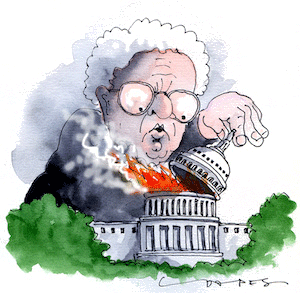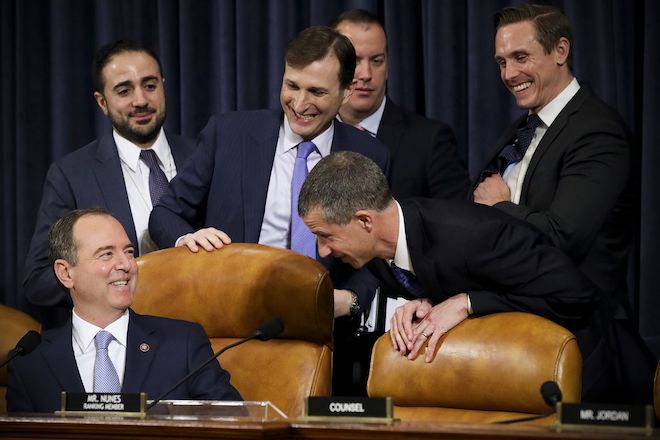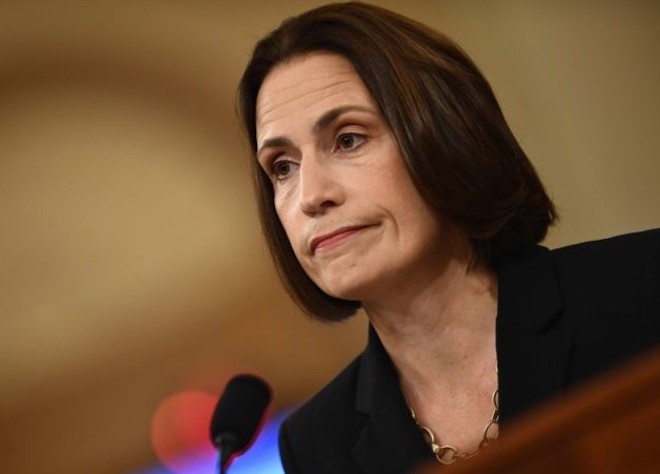The triumph of tribal epistemology
ROGER FITCH ESQ • THURSDAY, NOVEMBER 28, 2019
Roger Fitch examines where Congress is heading with its impeachment investigation ... Factoids and the Republican defence ... Picking-up where Mueller left off ... The impeachable provision of bribery ... False equivalence narratives from the media ... New distractions from Bill Barr ... And Trump sanctions war crimes
"The trouble with most folks isn't so much their ignorance, as knowing so many things that ain't so."
- 19th century American humorist Josh Billings, anticipating Donald Trump supporters.
- 19th century American humorist Josh Billings, anticipating Donald Trump supporters.
"A decades-long effort on the right has resulted in a parallel set of institutions meant to encourage tribal epistemology. They mimic the form of mainstream media, think tanks, and the academy, but without the restraint of transpartisan principles. They are designed to advance the interests of the right, to tell stories and produce facts that support the tribe ... Talk radio and the birth of Fox News in the 1990s were turning points. They eventually expanded to create an entire, complete-unto-itself conservative information universe ... capable of cranking out stories and facts (or "facts") in support of the conservative cause 24 hours a day, steadily shaping the worldview of their white suburban audience around a forever war with The Libs, who are always just on the verge of destroying America."
- David Roberts on Republican tribalism.
- David Roberts on Republican tribalism.
 The recently-completed Mueller Report has been characterised as a film noir in which, "The investigators uncovered the plot, but the society is too rotten to do anything about it".
The recently-completed Mueller Report has been characterised as a film noir in which, "The investigators uncovered the plot, but the society is too rotten to do anything about it".
Will impeachment face the same fate? Even if the US House of Representatives impeaches Trump, his rubber-stamp US Senate will block his removal from office - unless, perhaps, there's a secret senate ballot.
The House Intelligence Committee's impeachment inquiry picked up where Mueller left off, not yet addressing his findings on obstructions of justice (or new ones, see also here and here), and leaving for later the truth of Trump's written answers to Mueller's questions; more here.
House Democrats have the advantage of two new DC district court decisions. One (opinion here) upholds the legality of the impeachment and the right to Mueller's grand jury materials (more developments here); the other confirms that former White House Counsel Don McGahn must testify - consequences here.
The Intelligence Committee proceedings began with L'affaire Ukrainienne and concentrated on bribery, specifically mentioned in the constitution's Article II impeachment provisions. It's broader than the federal bribery statute, and is based on English common law at the time the constitution was adopted. This fact led to debate between Murdoch's Wall Street Journal and the legal website Lawfare over the interpretation of bribery by Blackstone et al.
House Republicans have responded with a disingenuous defence of failed or incomplete bribery, and deny that attempted bribery is impeachable.
A dramatic breakthrough in the Intelligence Committee proceedings occurred when a genial but vengeful witness, EU Ambassador Gordon Sondland, rolled over, also implicating Trump, Vice President Pence, Secretary of State Pompeo and Trump's budget director/acting chief of staff/all-around hatchet man, Mick Mulvaney.
Newly-disclosed governmental emails confirm Mulvaney's and Pompeo's participation.
Double standards prevail among house Republicans, who have cast the proceedings as political and illegitimate. Thus Clinton impeachment prosecutor Ken Starr initially argued that Trump's official conduct didn't rise to the level of impeachable, a standard apparently met by Clinton's lying about consensual sex in a civil court deposition (after Sondland's testimony, Starr changed his mind).
The pessimistic Paul Krugman sees the impeachment defence strategy as "a test of the depths to which the Republican party will sink". Perhaps, however, the Republican reaction is explained best in a thoughtful article in Vox, where David Roberts convincingly argues that the Republican response to Trump's pending impeachment represents the zenith of a decades-long campaign to subvert the perception of truth, a triumph of "tribal epistomology".
 House Intelligence Committee: bribery under the microscope
House Intelligence Committee: bribery under the microscope
The media are presenting the proceedings as a sort of wrestling match, with false equivalence narratives; there's a diversionary argument that public support is essential for removing Trump, implicitly reinforcing Republican claims that impeachment is purely political rather than - as impeachment historians point out - a constitutional remedy, independent of elections, for removing rotten rulers. Public support could, of course, influence wavering senate "jurors" facing re-election.
Trump's personal strategy is to charge the mostly career public servants who are speaking out with "retrospective incompetence"; naturally, he wants to sack the intelligence Inspector General who, as legally required, gave congress the whistleblower's account of the president's Ukraine extortion attempt.
Impeachment is now moving to the House Judiciary Committee, where further evidence will be taken and impeachment articles drafted and debated. Some useful testimony could still come from administration scoundrels, if the house Democrats will take the time to hear them.
Whatever happens, predictions for American democracy are dire, post-Trump. New laws will be needed, such as those introduced after Watergate.
* * *
While impeachment looms, Trump's disbarrable AG, Bill Barr, has been cooking up new distractions, hoping the president's fabricated FBI conspiracy theories will ignite some Reichstag fire.
Barr's narrative contradicts Trump's own acknowledgement to the Russians that he knew they interfered in the 2016 election - and that was OK. In house impeachment testimony, the Russian expert Dr Fiona Hill specifically rejected the Republicans' crackpot theories of Ukrainian interference in 2016.
 Fiona Hill, previously with the US National Security Council
Fiona Hill, previously with the US National Security Council
Impunity is meanwhile everywhere. In an action viewed as damaging the US military, Trump handed out pardons to convicted and accused US war criminals, though it's hard to see what votes he will get out of it, especially among service members, some of whom dobbed in their lawless officers and NCOs.
Defence opposed the pardons, particularly that of Chief Petty Officer Eddie Gallagher, one of the most vicious convicted SEALs. Trump, responding to a Fox News beat-up, sought to completely exonerate Gallagher, while the Navy tried to expel him from the SEALs. In an extraordinary action, the president personally ordered Gallagher's retention in the unit, and sacked the Navy Secretary.
What's next? Will Trump pardon the Blackwater mercenaries, convicted and sentenced in the shocking Nisour Square massacre in Baghdad?
Trump's sanctioning of war crimes begs the question, will he attempt to reintroduce torture, a practice he has condoned in the past. It's a timely subject, as a new film about the Senate Torture Report has put the notorious CIA torture program - implemented by George Bush - back in the news.
Barack Obama effectively pardoned participants in the Bush administration program, with dilatory and cosmetic inquiries conducted while the statutes of limitations - except for murder - ran. We now know that, even had Obama's Justice Department prosecuted and jailed those involved, Mr Trump would have pardoned them, given them medals, and, as he actually has done in the appointment of CIA Director Gina Haspel, rewarded them.
Trump has also successfully stonewalled the proposed ICC investigation into torture in Afghanistan and other Rome Statute countries where CIA torture occurred; the matter is now under appeal at the Hague. More here on the international efforts to hold accountable those countries implicated in CIA black site torture.
 Email
Email